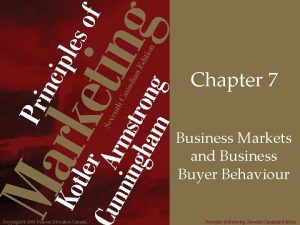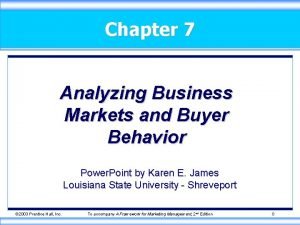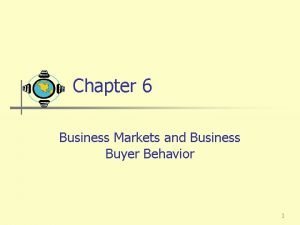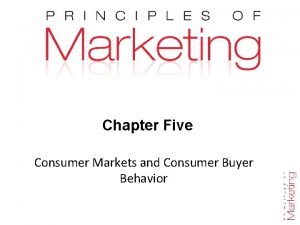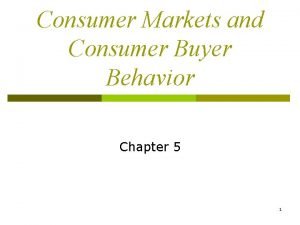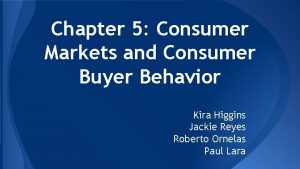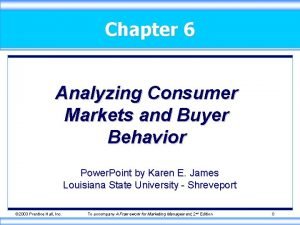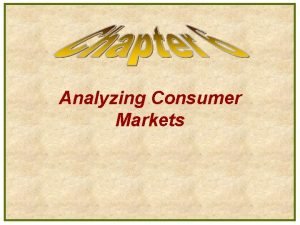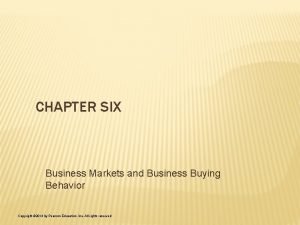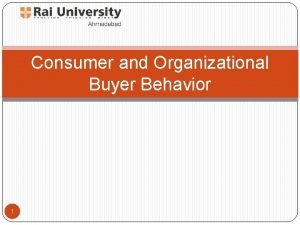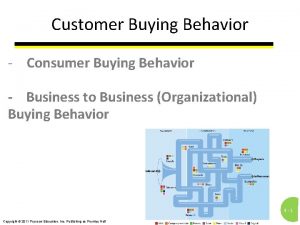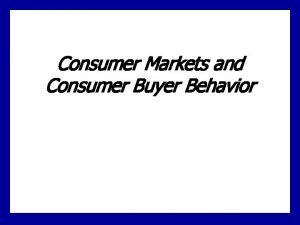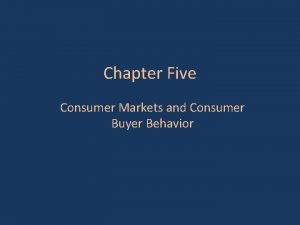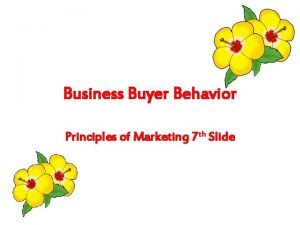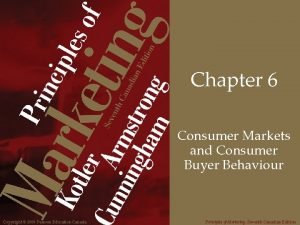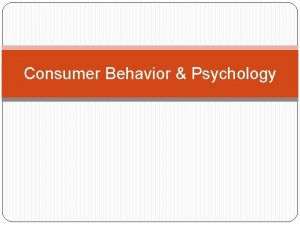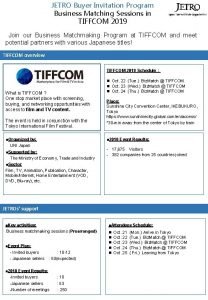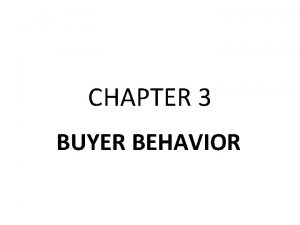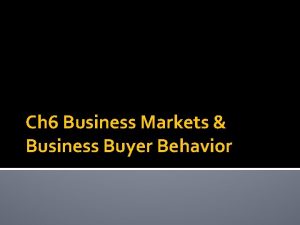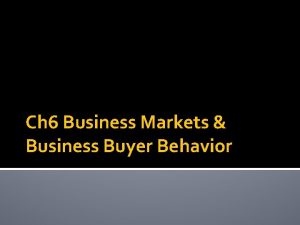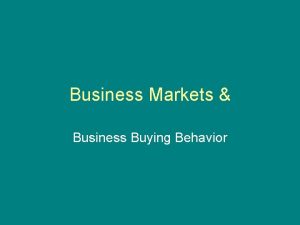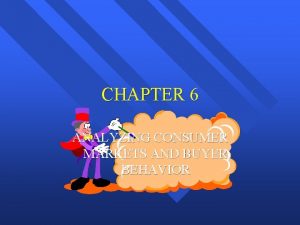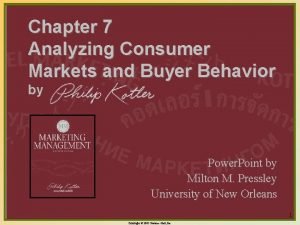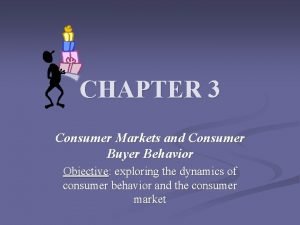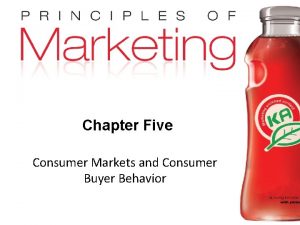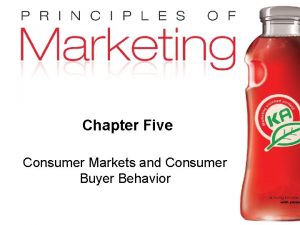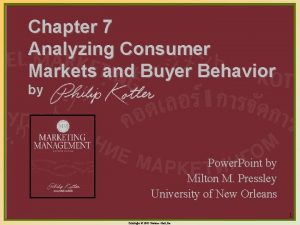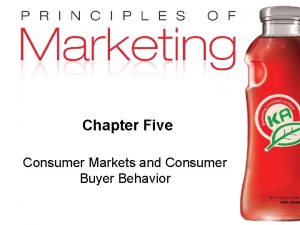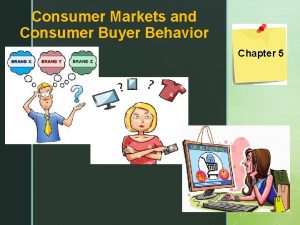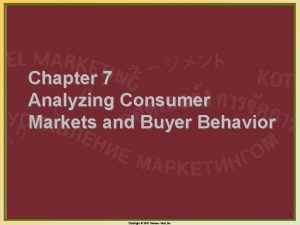Business Markets and Business Buyer Behavior Chapter 6

Business Markets and Business Buyer Behavior Chapter 6

Learning Goals 1. 2. 3. 4. Define the business market and how it differs from consumer markets Identify the major factors that influence business buyer behavior List and define the steps in the business buying decision process Compare the institutional and government markets and explain how they make their buying decisions 1

Definition Business Buyer Behavior: § The buying behavior of organizations that buy goods and services for use in the production of other products and services that are sold, rented, or supplied to others. § Also included are retailing and wholesaling firms that acquire goods for the purpose of reselling or renting them to others at a profit. 2 Goal 1: Define the business market

Characteristics of Business Markets § Sales in the business market far exceed sales in consumer markets. § Business markets differ from consumer markets in many ways. • Marketing structure and demand • Nature of the buying unit • Types of decisions and the decision process 3 Goal 1: Define the business market

Characteristics of Business Market Structure and Demand • Fewer, larger buyers • Geographically concentrated • Demand derived from consumers • Inelastic demand • Fluctuating demand Nature of the Buying Unit • More buyers • More professional purchasing effort Types of Decisions & the Decision Process • More complex decisions • Process is more formalized • Buyer and seller are more dependent on each other • Build close long-term relationships with customers 4

Business Markets Characteristics Marketing Structure and Demand Nature of the Buying Unit Types of Decisions and the Decision Process Compared to consumer markets: § Business markets • have fewer but larger customers § Business customers • are more geographically concentrated § Demand is different • Demand is derived • Demand is price inelastic • Demand fluctuates more Goal 1: Define the business market 5

Business Markets Characteristics Marketing Structure and Demand Nature of the Buying Unit Types of Decisions and the Decision Process Compared to consumer purchases: § Involve more buyers in the decision process § More professional purchasing effort 6 Goal 1: Define the business market

Business Markets Characteristics Marketing Structure and Demand Nature of the Buying Unit Types of Decisions and the Decision Process Compared to consumer purchases § More complex buying decisions § The buying process is more formalized § Buyers and sellers work more closely together and build long-term relationships 7 Goal 1: Define the business market

Business Buyer Behavior Major Types of Buying Situations § Straight rebuy • Reordering without modification § Modified rebuy • Requires modification to prior purchase § New task • First-time purchase 8 Goal 1: Define the business market

usiness Buying Situations Involved Decision Making New Task Buying Modified Rebuy Straight Rebuy 9

Model of Business Buyer Behavior Product Price Marketing and Other Stimuli Economic Technological Place Political Promotion Cultural Organizational Influences Product or Service Choice The Buying Organization The Buying Center Buying Decision Process Buyer’s Response Interpersonal and Individual Influences Delivery Terms and Times Supplier Choice Service Terms Order Quantities Payment 10

Business Buyer Behavior Members of the Buying Center Users Buyers Influencers Deciders Gatekeepers 11 Goal 1: Define the business market

Major Influences on Business Buying Environmental Economic, Technological, Political, Competitive & Cultural Organizational Objectives, Policies, Procedures, Structure, & Systems Interpersonal Authority, Status, Empathy & Persuasiveness Individual Age, Education, Job Position, Personality & Risk Attitudes Buyers 12

Major Influences on Business Buyers Key Factors Environmental Organizational Interpersonal Individual Economic trends Supply conditions Technological, political and competitive changes Culture and customs 13 Goal 2: Identify the major factors that influence business buyer behavior

Major Influences on Business Buyers Key Factors Environmental Organizational Interpersonal Individual Objectives Policies Procedures Organizational structure Systems 14 Goal 2: Identify the major factors that influence business buyer behavior

Major Influences on Business Buyers Key Factors Environmental Organizational Interpersonal Individual Influence of members in the buying center § § Authority Status Empathy Persuasiveness 15 Goal 2: Identify the major factors that influence business buyer behavior

Major Influences on Business Buyers Key Factors Environmental Organizational Interpersonal Individual Personal characteristics of members in the buying center § § § Age and income Education Job position Personality Risk attitudes Buying styles 16 Goal 2: Identify the major factors that influence business buyer behavior

Stages in the Business Buying Process Problem Recognition General Need Description Product Specification Supplier Search Proposal Solicitation Supplier Selection Order Routine Specification Performance Review 17

Stages in the Business Buying Process Stage 1: Problem Recognition Stage 2: General Need Description Stage 3: Product Specification § Value analysis helps to reduce costs Stage 4: Supplier Search § Supplier development 18 Goal 3: List and define the steps in the business buying decision process

Stages in the Business Buying Process Stage 5: Proposal Solicitation Stage 6: Supplier Selection Stage 7: Order-Routine Specification § Blanket contracts are often used for maintenance, repair and operating items. Stage 8: Performance Review 19 Goal 3: List and define the steps in the business buying decision process

Business Buying on the Internet § E-procurement is growing rapidly § Online auctions and online trading exchanges (e-marketplaces) account for much of the online purchasing activity § E-procurement offers many benefits: • Access to new suppliers • Lower purchasing costs • Quicker order processing and delivery 20 Goal 3: List and define the steps in the business buying decision process

Institutional and Government Markets Institutional Markets § Consist of churches, schools, prisons, hospitals, nursing homes and other institutions that provide goods and services to people in their care. 21 Goal 4: Compare the institutional and government markets

Institutional and Government Markets Institutional Markets § Often characterized by low budgets and captive patrons. § Marketers may develop separate divisions and marketing mixes to service institutional markets. 22 Goal 4: Compare the institutional and government markets
- Slides: 23

